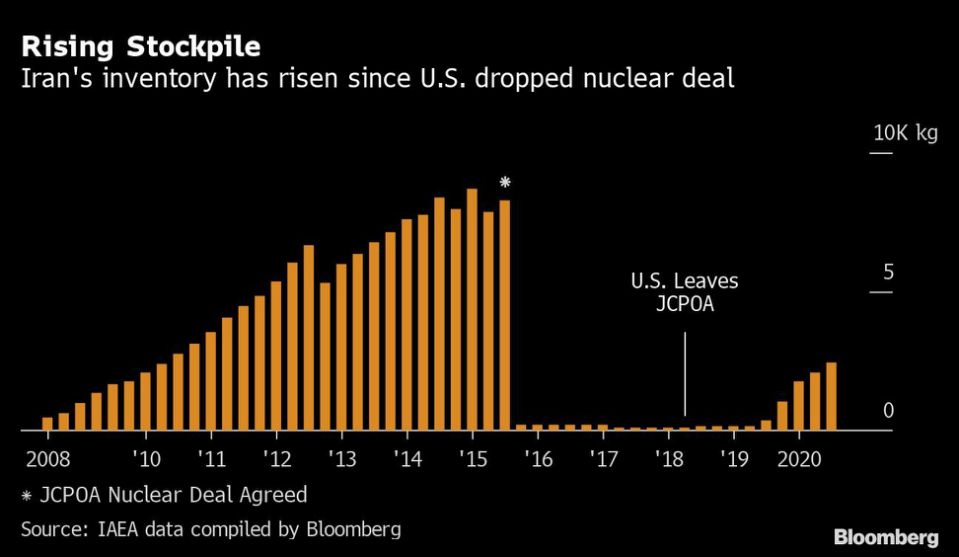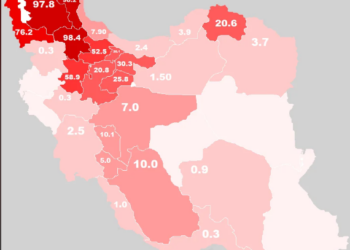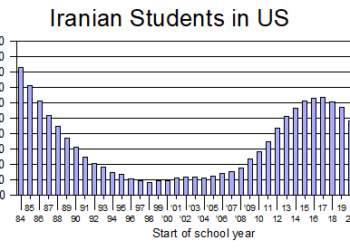January 22, 2021

at about the same speed as it was before the JCPOA, but it is still far from
having as much stocked up as it did before the deal was signed in 2015.
In its latest breach of the nuclear deal, Iran has started research on uranium metal-based fuel for a research reactor, the International Atomic Energy Agency (IAEA) has reported.
This is an especially important breach because it involved research and development (R&D) work. The Islamic Republic likes to say that all its breaches can be easily reversed if the US ends its sanctions. And while the number of centrifuges or the amount of enrichment can indeed be easily reversed, R&D work cannot be undone. Any return to the original agreement would require some adjustment to account for the R&D work done by Iran.
Iran has been accelerating its breaches of the deal in the past two months. They are part of a process started by Tehran in 2019 of committing breaches in response to President Trump’s 2018 withdrawal from the deal and his reimposition of sanctions.
Iran seems to think that the moves raise pressure on President Biden to resume full compliance quickly. But analysts in the West generally do not see it that way. Many think it makes it harder for the agreement to be put back together—and the R&D violations make it much harder.
“[IAEA] Director General Rafael Mariano Grossi today [January 13] informed IAEA Member States about recent developments regarding Iran’s plans to conduct R&D activities on uranium metal production as part of its declared aim to design an improved type of fuel for the Tehran Research Reactor,” the IAEA said in a statement.
The 2015 deal specifically imposes a 15-year ban—until 2030—on Iran producing or acquiring uranium metal, a sensitive material that can be used in the core of a nuclear bomb.
The IAEA’s report said Iran had indicated it plans to produce uranium metal from natural uranium and then produce uranium metal enriched up to 20 percent for fuel for the Tehran Research Reactor.
Although uranium metal in theory can be geared toward generating electricity, experiments with metal alloys are prohibited under the nuclear deal because uranium metal is a key material in the making of nuclear weapons. The process involves converting high-enriched uranium gas into metal that provides the cladding, or outer covering, for the fuel rods that power a nuclear reaction.
“Iran had not previously experimented with this step in the process, but in order to make a bomb, you would have to,” Daryl Kimball, executive director of the Arms Control Association, based in Washington, told ABC News.
The timing of the uranium metal announcement, Kimball said, left little doubt about Iran’s intentions.
“They know there’s someone named Biden who’s going to be in the White House next week and they want him to act as soon as possible to waive nuclear-related sanctions,” he said. “They are looking for ways to underscore that their patience has run out.”
Britain, France and Germany said a week earlier that Iran “risks compromising” chances of diplomacy with Washington after Tehran announced another violation — that it was starting to enrich uranium to 20 percent purity, a technical step away from weapons-grade levels of 90 percent.
The foreign ministers of the three European nations—who have been showing increasing impatience with Tehran—said in a joint statement that the Iranian activity “has no credible civil justification.” They said the enrichment was a clear violation of the deal and “further hollows out the agreement.”


















